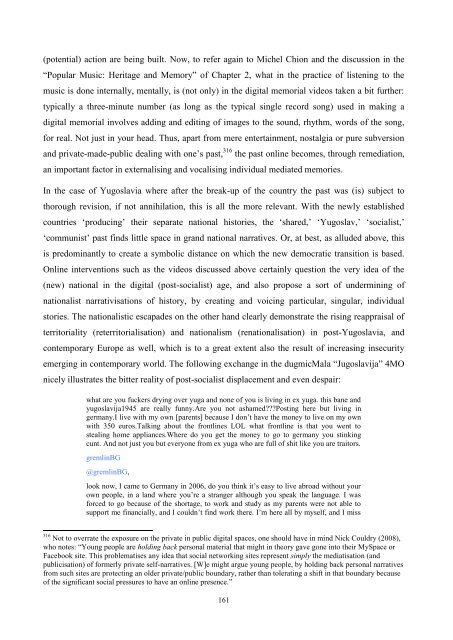UNIVERSITY OF NOVA GORICA GRADUATE SCHOOL ...
UNIVERSITY OF NOVA GORICA GRADUATE SCHOOL ...
UNIVERSITY OF NOVA GORICA GRADUATE SCHOOL ...
Create successful ePaper yourself
Turn your PDF publications into a flip-book with our unique Google optimized e-Paper software.
(potential) action are being built. Now, to refer again to Michel Chion and the discussion in the<br />
―Popular Music: Heritage and Memory‖ of Chapter 2, what in the practice of listening to the<br />
music is done internally, mentally, is (not only) in the digital memorial videos taken a bit further:<br />
typically a three-minute number (as long as the typical single record song) used in making a<br />
digital memorial involves adding and editing of images to the sound, rhythm, words of the song,<br />
for real. Not just in your head. Thus, apart from mere entertainment, nostalgia or pure subversion<br />
and private-made-public dealing with one‘s past, 316 the past online becomes, through remediation,<br />
an important factor in externalising and vocalising individual mediated memories.<br />
In the case of Yugoslavia where after the break-up of the country the past was (is) subject to<br />
thorough revision, if not annihilation, this is all the more relevant. With the newly established<br />
countries ‗producing‘ their separate national histories, the ‗shared,‘ ‗Yugoslav,‘ ‗socialist,‘<br />
‗communist‘ past finds little space in grand national narratives. Or, at best, as alluded above, this<br />
is predominantly to create a symbolic distance on which the new democratic transition is based.<br />
Online interventions such as the videos discussed above certainly question the very idea of the<br />
(new) national in the digital (post-socialist) age, and also propose a sort of undermining of<br />
nationalist narrativisations of history, by creating and voicing particular, singular, individual<br />
stories. The nationalistic escapades on the other hand clearly demonstrate the rising reappraisal of<br />
territoriality (reterritorialisation) and nationalism (renationalisation) in post-Yugoslavia, and<br />
contemporary Europe as well, which is to a great extent also the result of increasing insecurity<br />
emerging in contemporary world. The following exchange in the dugmicMala ―Jugoslavija‖ 4MO<br />
nicely illustrates the bitter reality of post-socialist displacement and even despair:<br />
what are you fuckers drying over yuga and none of you is living in ex yuga. this bane and<br />
yugoslavija1945 are really funny.Are you not ashamed???Posting here but living in<br />
germany.I live with my own [parents] because I don‘t have the money to live on my own<br />
with 350 euros.Talking about the frontlines LOL what frontline is that you went to<br />
stealing home appliances.Where do you get the money to go to germany you stinking<br />
cunt. And not just you but everyone from ex yuga who are full of shit like you are traitors.<br />
gremlinBG<br />
@gremlinBG,<br />
look now, I came to Germany in 2006, do you think it‘s easy to live abroad without your<br />
own people, in a land where you‘re a stranger although you speak the language. I was<br />
forced to go because of the shortage, to work and study as my parents were not able to<br />
support me financially, and I couldn‘t find work there. I‘m here all by myself, and I miss<br />
316 Not to overrate the exposure on the private in public digital spaces, one should have in mind Nick Couldry (2008),<br />
who notes: ―Young people are holding back personal material that might in theory gave gone into their MySpace or<br />
Facebook site. This problematises any idea that social networking sites represent simply the mediatisation (and<br />
publicisation) of formerly private self-narratives. [W]e might argue young people, by holding back personal narratives<br />
from such sites are protecting an older private/public boundary, rather than tolerating a shift in that boundary because<br />
of the significant social pressures to have an online presence.‖<br />
161

















